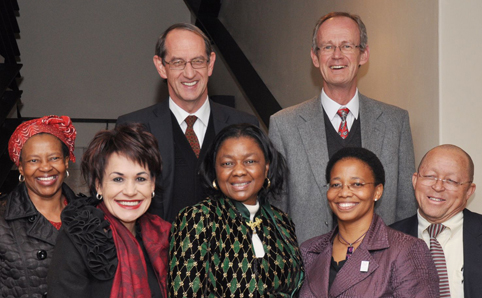|

|
Some of the guests who attended the Charlotte Maxeke Lecture were from the left front: Carol Mokobe; Director of the Free State Provincial Government Department of Women, Children and People with Disabilities; Prof.Driekie Hay, Vice-Rector: Academic; Prof. Hlengiwe Mkhize, Deputy Minister of Higher Education and Training; Dr.Choice Makhetha, Vice-Rector: External Relations(actg); Prof. Nicky Morgan, Vice-Rector: Operations. Back from the left are: Dr. Derek Swemmer, Registrar and Prof. Teuns Verschoor, Vice-Rector: Institutional Affairs.
Photo: Stephen Collett |
More than 200 people, amongst them the Deputy Minister of Higher Education and Training, Prof. Hlengiwe Mkhize, came together at our university to reflect on the life of ANC Women’s League stalwart Charlotte Maxeke, during the Charlotte Maxeke Memorial Lecture organised annually by the Free State Provincial Government and our university as a lead-up to National Women’s Day on Tuesday, 9 August 2011.
This year was the fourth memorial lecture and Prof. Mkhize delivered the main address under the theme “Women’s access to education, science and technology for economic growth and development in bringing about positive change, living in extraordinary times”
Prof. Mkhize told guests Charlotte Maxeke’s life was too rich and complex to capture during the night and listed many of Maxeke’s achievements during her life and times. These included Maxeke being the first woman to graduate with a science degree from the University of Wilberforce, Ohio. Prof. Mkhize said Charlotte Maxeke’s science degree was not a personal achievement, because she went back to the people and served by opening the Wilberforce Institute in Evaton, Vereeniging, after her return from the United States.
Prof. Mkhize applauded our university for organising the lecture, saying the university’s commitment was appropriate for the contribution Charlotte Maxeke made to women’s empowerment. She said government have a huge interest in our university and said the lecture provided an opportunity to dialogue and to use the experience to improve the country’s institutions. Delivering the last part of her address, Prof. Mkhize said she hopes the lecture will lead to great things, with the local community also becoming involved in organising the event.
Dr. Choice Makhetha, Acting Vice-Rector: External Relations, announced at the event that the university will open a women’s memorial garden on Tuesday, 9 August 2011 to honour women who made a contribution in society.